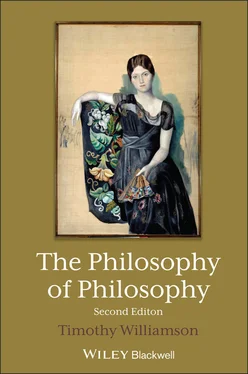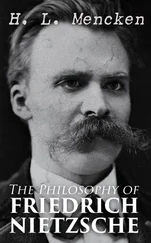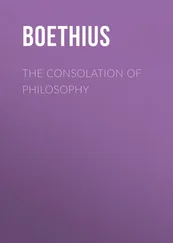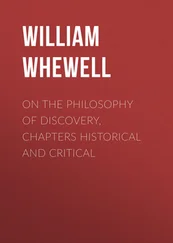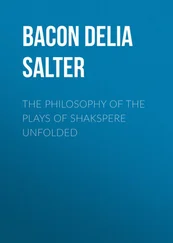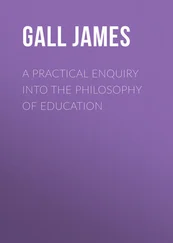1 ...8 9 10 12 13 14 ...31 One main theme of this book is that the common assumption of philosophical exceptionalism is false. Even the distinction between the a priori and the a posteriori turns out to obscure underlying similarities. Although there are real methodological differences between philosophy and the other sciences, as actually practiced, they are less deep than is often supposed. In particular, so-called intuitions are simply judgments (or dispositions to judgment); neither their content nor the cognitive basis on which they are made need be distinctively philosophical. In general, the methodology of much past and present philosophy consists in just the unusually systematic and unrelenting application of ways of thinking required over a vast range of non-philosophical inquiry. The philosophical applications inherit a moderate degree of reliability from the more general cognitive patterns they instantiate. Although we cannot prove, from a starting-point a sufficiently radical skeptic would accept, that those ways of thinking are truth-conducive, the same holds of all ways of thinking, including the methods of natural science. That is the skeptic’s problem, not ours. By more discriminating standards, the methodology of philosophy is not in principle problematic.
Some may wonder whether philosophy has a method to be studied, especially if it is as methodologically undistinctive as just suggested. Forget the idea of a single method, employed in all and only philosophical thinking. Still, philosophers use methods of various kinds: they philosophize in various ways. A philosophical community’s methodology is its repertoire of such methods. The word “method” here carries no implication of a mechanically applicable algorithm, guaranteed to yield a result within a finite time. On this loose understanding of what a methodology is, it is disingenuous for a philosopher to claim to have none.
Another main theme of this book is that the differences in subject matter between philosophy and the other sciences are also less deep than is often supposed. In particular, few philosophical questions are conceptual questions in any distinctive sense, except when philosophers choose to ask questions about concepts, as they may but need not do. Philosophical questions are those philosophers are disposed to ask, which in turn tend, unsurprisingly, to be those more amenable to philosophical than to other ways of thinking; since the philosophical ways of thinking are not different in kind from the other ways, it is equally unsurprising that philosophical questions are not different in kind from other questions. Of course, philosophers are especially fond of abstract, general, necessary truths, but that is only an extreme case of a set of intellectual drives present to some degree in all disciplines.
In most particular cases, philosophers experience little difficulty in recognizing the difference between philosophy and non-philosophy. Being philosophers, they care about the difference, and have a professional temptation to represent it as a deep philosophical one. But just about every institutionally distinct discipline acquires a professional identity, and its practitioners experience little difficulty in recognizing the difference between what “we” do and what “they” do in most particular cases. They care about the difference, and have a professional temptation to represent it in the terms of their own discipline. But such temptations can be resisted. The distinction between the Department of Philosophy and the Department of Linguistics or the Department of Biology is clearer than the distinction between philosophy and linguistics or biology; the philosophy of language overlaps the semantics of natural languages and the philosophy of biology overlaps evolutionary theory.
The unexceptional nature of philosophy is easier to discern if we avoid the philistine emphasis on a few natural sciences, often imagined in crudely stereotyped ways that marginalize the role of armchair methods in those sciences. Not all science is natural science. Whatever crude empiricists may say, mathematics is a science if anything is; it is done in an armchair if anything is. In no useful sense are mathematical questions conceptual questions. If mathematics is an armchair science, why not philosophy too?
Most philosophers are neither crude rationalists nor crude empiricists nor, these days, linguistic or conceptual philosophers. Many would accept the theses just enunciated about the methodology and subject matter of philosophy. But a third theme of this book is that the current philosophical mainstream has failed to articulate an adequate philosophical methodology, in part because it has fallen into the classic epistemological error of psychologizing the data. For example, our evidence is sometimes presented as consisting of our intuitions: not their content, since it is allowed that some of our intuitions may be false, but rather our psychological states of having those intuitions. We are then supposed to infer to the philosophical theory that best explains the evidence. But since it is allowed that philosophical questions are typically not psychological questions, the link between the philosophical theory of a non-psychological subject matter and the psychological evidence that it is supposed to explain becomes problematic: the description of the methodology makes the methodology hard to sustain. Again, philosophy is often presented as systematizing and stabilizing our beliefs, bringing them into reflective equilibrium: the picture is that in doing philosophy what we have to go on is what our beliefs currently are, as though our epistemic access were only to those belief states and not to the states of the world that they are about. The picture is wrong; we frequently have better epistemic access to our immediate physical environment than to our own psychology. A popular remark is that we have no choice but to start from where we are, with our current beliefs. But where we are is not only having various beliefs about the world; it is also having significant knowledge of the world. Starting from where we are involves starting from what we already know, and the goal is to know more (of course, how much more we come to know cannot be measured just by the number of propositions learnt). To characterize our method as one of achieving reflective equilibrium is to fail to engage with epistemologically crucial features of our situation. Our understanding of philosophical methodology must be rid of internalist preconceptions.
Philosophical errors distort our conception of philosophy in other ways too. Confused and obscure ideas of conceptual truth create the illusion of a special domain for philosophical investigation. Similarly, although perception clearly involves causal interaction between perceiver and perceived, crudely causal accounts of perceptual knowledge that occlude the contribution of background theory create the illusion of a contrast between world-dependent empirical beliefs and world-independent philosophical theory.
Clearly, the investigation of philosophical methodology cannot and should not be philosophically neutral. It is just more philosophy, turned on philosophy itself. We have the philosophy of mathematics, the philosophy of physics, the philosophy of biology, the philosophy of economics, the philosophy of history; we also need the philosophy of philosophy.
The rethinking of philosophical methodology in this book involves understanding, at an appropriate level of abstraction, how philosophy is actually done. Philosophers of science know the dangers of moralizing from first principles on how a discipline should ideally be pursued without respecting how it currently is pursued; the same lesson applies to the philosophy of philosophy. The present opposition to philosophical exceptionalism is far from involving the idea that philosophers should model themselves on physicists or biologists. The denial that philosophical questions are conceptual questions is quite compatible with a heavy emphasis on issues of semantic structure in philosophical discussion, for the validity or otherwise of philosophical reasoning is often highly sensitive to delicate aspects of the semantic structure of premises and conclusion: to make our reasoning instruments more reliable, we must investigate those instruments themselves, even when they are not the ultimate objects of our concern.
Читать дальше
